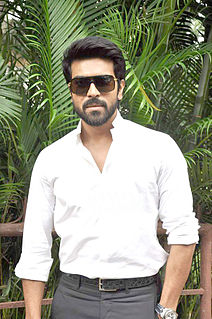A Quote by Ram Charan
'Dhruva' is not a first person narrative of Siddharth Abhimanyu.
Quote Topics
Related Quotes
A lot of artists I like end up being queer. Or maybe it's a subconscious thing that you can identify of, like, 'Oh this person understands the nuances of the romantic narrative of a queer person, or the social narrative of a queer person.' And then you discover, lo and behold that they are a queer person.
There's some ambient music that doesn't do anything. I wouldn't say that that's narrative. It is narrative in that it creates a sort of world where nothing happens, where really nothing happens, so you become a different person after hearing eight minutes of exactly the same thing. Yes, I hear music all the time in which one idea is strung together to another idea, and I feel that such music is non-narrative.
When it comes to the form the narrative will take, whether first person, third person, or Aunt Grace's cat, I usually find that the story tells me which voice it prefers, and that often changes as I go along. And in the end it really doesn't matter as long as the author can rig those voices all in harness to pull the same load.


































